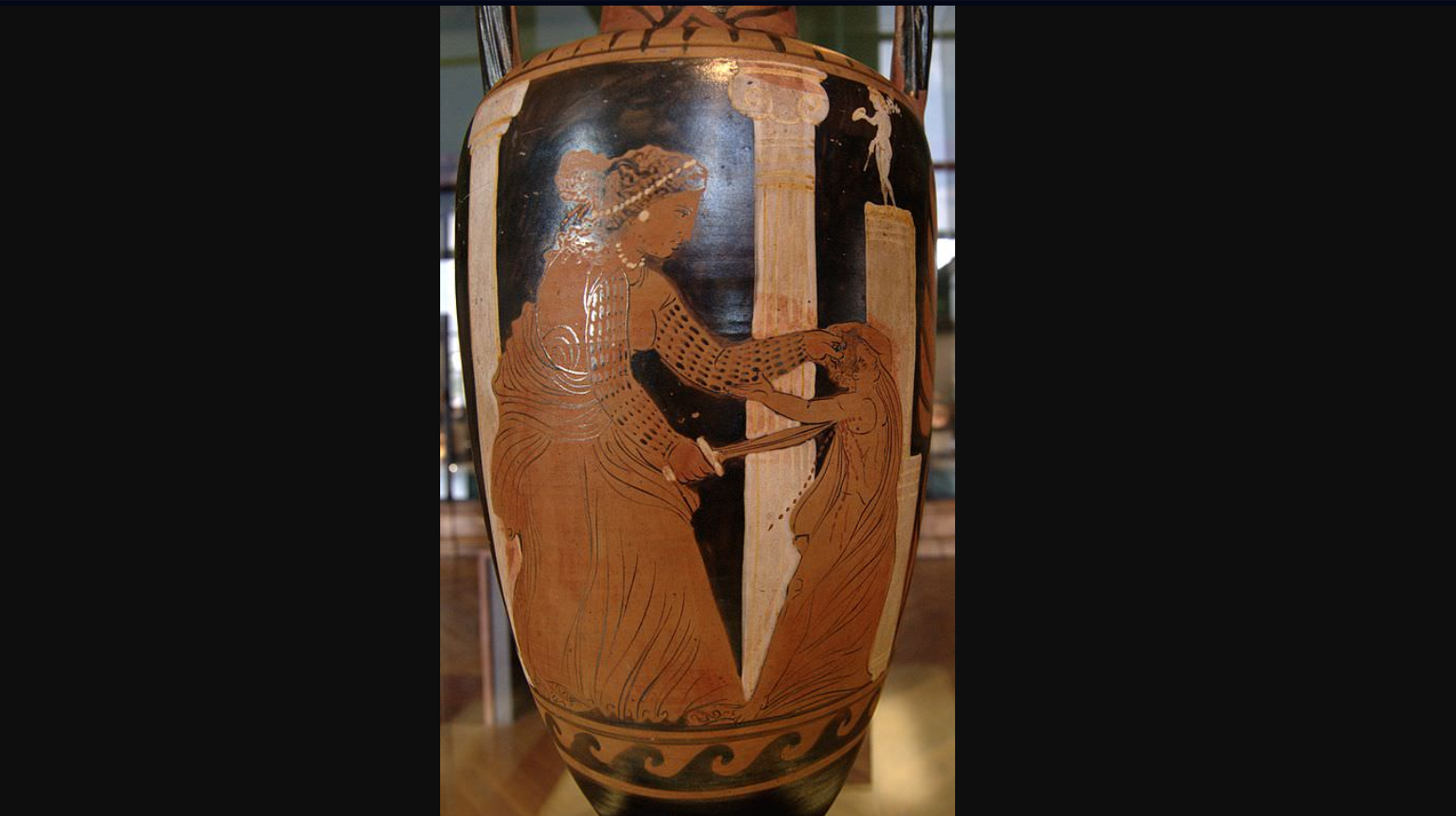‘Thebes: The Forgotten City of Ancient Greece’ Review: Mythic Roots
Spartans and Athenians thought of Thebans as uncivilized, but under Epaminondas they became beacons of Greek culture.
If you imagine yourself in ancient Greece, it is probably in one of the two principal cities (or city-states), democratic, fractious, philosophy-loving Athens, or oligarchic, disciplined, anti-tyrannical Sparta. As a woman (if a freeborn citizen), you might be better off in Sparta, where you could own property, get a formal education and compete in athletics. (A good Athenian woman stayed home.) You wouldn’t want to be a slave in either place, but perhaps especially not Sparta, which held an entire population (possibly an ethnic group)—the helots—in a kind of sharecropping serfdom, kept servile, indeed terrorized, by a secret police and arbitrary state-sanctioned murder. In many ways, Athens and Sparta seem like opposite extremes. But what comes to mind at the mention of a third major Greek city, Thebes?
In legend Thebes can seem like a dark place: polluted with plague, Oedipal patricide and incest and civil war between brothers (the Seven Against Thebes); or maybe it is a crossroads, with a female monster, the Sphinx, at its center, asking her lethal riddle with a flick of her tail. As for Boeotia, the region of which Thebes is the principal city, the word connotes hicksville, the sticks, the adjective “Boeotian” a byword for backward, uncouth. Pindar himself, the Theban poet par excellence, refers to the slur “Boeotian swine”; Hesiod, another Boeotian poet (and a founder of Greek literature), describes his hometown of Ascra as being “wretched in winter, horrible in summer, never nice.” Yet Thebes was one of Greece’s major cities, and for one brief moment—maybe even a shining one—the lead city in Greece. Paul Cartledge, in “Thebes: The Forgotten City of Ancient Greece,” puts the city back on the cultural map, and makes a case for the Theban general Epaminondas as the Nelson of his day.
Mr. Cartledge, a professor emeritus at Cambridge and author of popular history books such as “The Spartans,” “Thermopylae,” “Alexander the Great” and “Democracy: A Life,” has picked an opportune time to look afresh at Thebes and Boeotia. The modern city of Thebes, an uninspiring market town, would not normally attract tourists, but is home to a glittering new museum, among the most up-to-date in Greece, featuring exhibits of archaeological finds (many unique in type) and historical objects from prehistory to the present. (One exhibit is titled, provocatively, “The Intellectual Radiance of Boeotia.”) There is a book forthcoming, from scholar James Romm, about Thebes’s “Sacred Band,” its elite unit of soldiers, made up of pairs of devoted homosexual lovers. Thebes is in the spotlight.
As Thebes stands central to the geography of Greece, mythological Thebes stands at the center of Greek mythology. According to legend, Cadmus, a prince of Phoenician Tyre (modern Lebanon), founded the seven-gated city, having sailed to Greece in search of his Zeus-abducted sister, Europa. After slaying a dragon, he sowed the land with its teeth, from which sprang the first Thebans; like the Athenians, the Thebans considered themselves autochthonous. Cadmus is supposed to have brought the “Cadmean letters”—the alphabet—to Greece. (There is more to this than mythology; the Greek alphabet does indeed come from the Phoenicians, with the addition of Greek vowels.)
It is from Boeotia that the expedition to Troy set out. And where would Greek drama be without the cycle of Theban myths, tragic Oedipus and his descendants? Thebes even boasted two homegrown yet Panhellenic gods: Dionysus, god of theater and wine, and the hero-turned-god, Heracles. The idea that Thebes and Boeotia were somehow uncultured is easy to debunk by pointing to its poets and writers, among them Hesiod, Pindar and Plutarch. Thebes also produced the Greek world’s first celebrity musician, Pronomus, who played the reeded instrument called an aulos.
But if there is dark mythology at the heart of the mythical Thebes, there is a shadow, too, over the historical one—Alexander the Great used it as a pretext to raze the city to the ground in 335 B.C., sparing the house of Pindar. During the Persian invasions in the early fifth century B.C., Thebes, like many Greek cities, had “medized,” that is, it defected to the Persians. (A moving description in Herodotus describes a Theban noble giving a banquet to a select group of Thebans and Persians on the eve before the Battle of Plataea. This seems to have been a gloomy affair, as one of the Persians, having a premonition that most of the guests, himself included, were shortly to perish, burst into tears.) Classical Thebes spent much of its subsequent history trying to expunge the taint of treachery from its reputation.
As Mr. Cartledge makes clear, war was not an extraordinary circumstance for a Greek city-state, but its usual condition. Campaigning amounted to an annual season, like harvest time. After a successful joint effort by the Greeks to push back the Persians in the fifth century B.C., the cities went back to fighting among themselves, descending into something like an all-out (Greek) world war, in which all Greek cities had to ally either with Athens or Sparta; eventually Sparta emerged victorious. When we picture the Athens of Plato or Aristotle, it is easy to forget it was a defeated city, already sliding into its decline. The city that would break Sparta’s hold on the Greek world was Thebes.
The biography of the Theban leader Epaminondas (418 B.C.-362 B.C.) written by Plutarch is, unfortunately, lost. Even so, his reputation shines. Admired by figures from Cicero and Montaigne to Sir Walter Raleigh (who called him “the worthiest man that ever was bred by the nation of Greece”), Epaminondas seems to have had a philosophical bent as well as a brilliant military mind. He was probably a Pythagorean by leaning—a disciple, in his youth, of the philosopher Lysis of Taras. Pythagoreans, who did not eat meat, believing in the transmigration of souls, also perhaps observed a kind of equality among men and women, slave and free. Ancient sources mock Epaminondas for affecting a philosopher’s dress, owning a single “rough” and dirty cloak.
Greek hoplite warfare in Epaminondas’ time was a standardized affair: The two armies lined up against each other, with the place of honor, the right flank, belonging to the strongest fighters; the second most honorable place was the left flank. Thus, the strongest fighters of each army first faced the second strongest fighters of the opposing side. At the watershed Battle of Leuctra in 371 B.C., Epaminondas made a radical shift, placing his strongest fighters (his special force, the “Sacred Band”) on the left flank, to face the prime Spartan fighters. Once these were defeated, it was a rout; the Spartans were not, after all, invincible. Perhaps his greatest act, though, even if it might have been intended more to inconvenience the Spartans than as a benevolent deed, was freeing the helots of Messenia, a people that had been enslaved by the Spartans for 300 years. He helped found a new capital city for the Arcadian federation (Megalopolis), and also for the ex-helots (Messene). Maybe Epaminondas was not only the Nelson of his age, but the Lincoln as well. He died in battle and was buried alongside his male beloved, Caphisodorus, with an epitaph that listed his children (daughters, being female) as the cities Messene and Megalopolis; it ended “Greece is free.”
Mr. Cartledge’s command of the historical material is effortless and exhaustive, and his appreciation of Thebes is persuasive. Between the radical but self-destructive democracy of Athens and Sparta’s totalitarian oligarchy (both imperialist), Thebes and Boeotia stand in the middle as an early model of democratic federalism—the “united states” of Boeotia, for instance, shared a currency. It was Thebes that dealt a critical blow to Spartan domination, and a Theban leader who freed a long-enslaved people. Alexander the Great himself adopted military tactics from Epaminondas. If Thebes’s period of hegemony was brief—barely a decade—it also changed the course of the ancient world.
—Ms. Stallings is a poet and translator. Her latest translation is “The Battle Between the Frogs and the Mice: A Tiny Homeric Epic.”
Copyright ©2020 Dow Jones & Company, Inc. All Rights Reserved. 87990cbe856818d5eddac44c7b1cdeb8
Appeared in the September 12, 2020, print edition as 'Greece’s Mythic Heartland.'
Source: wsj









